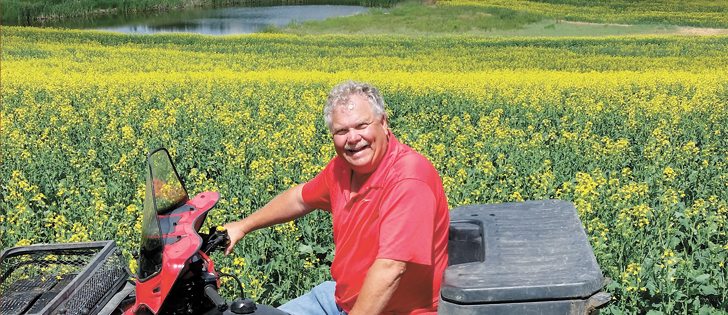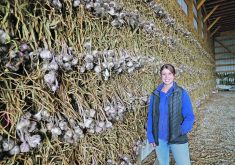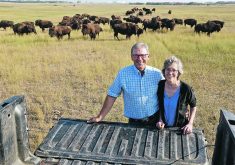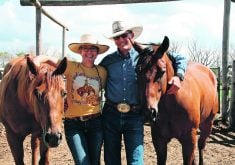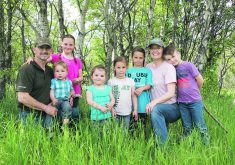Community and industry involvement helps make sure ‘everything moves forward and gets better for everybody’
OYEN, Alta. — Marlene Caskey is set to leave for a casino fundraiser for her rural community later this day while her husband, Graham, attends meetings for the Alberta Prairie Conservation Forum.
Their involvements have also included Boy Scouts and Girl Guides, the Lions/Lioness Club and the Oyen Chamber of Commerce.
“I don’t look at it as community service; just working with people and mankind to make sure everything moves forward and gets better for everybody,” said Graham.
Community service is important to the Caskeys, who farm 5,000 acres of wheat, durum, canola and peas in the Lanfine district in eastern Alberta.
Read Also

Sustainable food has ‘lost all meaning’: prof
That marketing strategy is deader than a doornail, says a University of Guelph professor who specializes in consumer preferences and perceptions of agriculture and food.
“It helps me see the bigger picture,” said Marlene, a past director with the Alberta Canola Producers Commission.
“I learned more there than in college. Customers are thousands of miles away, and if we want to sell to people, we need to know what their needs are.”
She said women take a different tack than men on boards.
“We look for collaboration. I try to see other points of view in making a decision,” she said.
“When we come along, we change the dynamics in the room, but in the end we all work toward a common goal.”
Such busy lives mean prioritizing tasks and managing time, which includes sending regrets for meetings during seeding and harvest.
For Graham, the miles spent travelling to meetings are time for quiet reflection and rational thought.
“There are certain times of the year that we cannot do all this community service,” said Graham, a municipal councillor.
Marlene described Graham as driven, ambitious and a big picture thinker who does a lot of things in the background that might go unnoticed.
The pair, who can fly planes and run large trucks, operated a petroleum company in their early farming career in addition to trucking fresh water to oil fields and homes.
They deal with the challenges of their remote location and the loss of rail service in 2010 by forward contracting grain and hiring out some of their grain hauling.
However, Marlene said they have little control over the costs of inputs and outputs.
“Any other business could say, ‘this is my bottom line’. In agriculture, we don’t have that option,” she said.
Marlene said that might be among the reasons young people are reluctant to enter farming.
Her own adult children, Justin, an engineer, and Christine, a lawyer, with their four sons, help with farming when they can.
“Their heart’s on the farm but their future is not likely to be here.”
Graham’s grandfather, Samuel, homesteaded the farm in 1912 before it was passed down to Graham’s parents, Clarence and Agnes. The farm also included land once belonging to J.W. Johnston, Marlene’s great-grandfather. Russell, his son, later farmed it until it was taken over by Marlene’s parents, Vernon and Helen.
Graham said the retention of medical services is a factor in attracting and retaining people in rural areas.
“Now if we want a specialist, we travel 220 kilometres on the road every time you want a five minute appointment with a doctor,” he said.
“That’s a barrier as you age.”
The Caskeys have employed conservation practices for many years in their semi-arid zone through continuous cropping, direct seeding and low to no disturbance.
Marlene said the dirt piled up on fence lines in this wide open country in the 1930s.
“If it blows away, it does not come back,” she said.
“We try to keep that soil at home.”
Graham said heading the Alberta Conservation Tillage Society for two decades and working with a research network kept him abreast of the latest information.
“I would like to see something go in the field first and actually work before we spend a massive amount of money,” Graham said.
They got off to a good start this year, which contrasted with last year’s drought when July rains came too late and yields were down.
They take annual breaks from the business for such outings as family fishing trips in northern Saskatchewan.
Recently, they sold 20 percent of their land to make it more manageable for their senior years, citing challenges in accessing a labour force here.
“Our children are reluctant to put in the hours we put in and frankly not willing to do that,” he said.
Graham said farmers are always on call.
“We live our business,” he said.
Graham plans to retain land for the next generation in case they choose to farm.
“We will hold some, for sure,” he said. “There will be some left for the legacy.”



